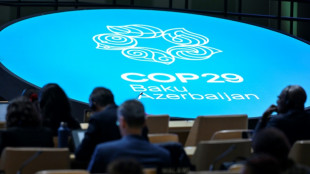
-
 Nadal's sensational career ends as Netherlands defeat Spain in Davis Cup
Nadal's sensational career ends as Netherlands defeat Spain in Davis Cup
-
US announces talks with Israel over civilian casualties in Gaza

-
 SpaceX fails to repeat Starship booster catch, as Trump looks on
SpaceX fails to repeat Starship booster catch, as Trump looks on
-
G20 summit ends with Ukraine blame game

-
 Trump appoints TV celebrity 'Dr. Oz' to key US health post
Trump appoints TV celebrity 'Dr. Oz' to key US health post
-
European stocks fall on Ukraine-Russia fears, US focused on earnings

-
 Last-gasp Szoboszlai penalty rescues Hungary draw with Germany
Last-gasp Szoboszlai penalty rescues Hungary draw with Germany
-
Germany, Netherlands draw as Nations League group stage ends

-
 Hong Kong tycoon Jimmy Lai takes witness stand in collusion trial
Hong Kong tycoon Jimmy Lai takes witness stand in collusion trial
-
Guardiola set to extend stay as Man City boss - reports

-
 Minnows Botswana hold Egypt to qualify with Mozambique, Tanzania
Minnows Botswana hold Egypt to qualify with Mozambique, Tanzania
-
Inter Miami coach Martino leaving club for 'personal reasons' - club source

-
 Chinese man sentenced to 20 months for Falun Gong harassment in US
Chinese man sentenced to 20 months for Falun Gong harassment in US
-
Hong Kong court jails 45 democracy campaigners, drawing condemnation

-
 'I did it for Rafa': Alcaraz after keeping Spain Davis Cup dream alive
'I did it for Rafa': Alcaraz after keeping Spain Davis Cup dream alive
-
Alcaraz keeps Spain and Nadal Davis Cup dream alive

-
 Trump names China hawk Howard Lutnick commerce secretary
Trump names China hawk Howard Lutnick commerce secretary
-
Europe's pivotal role in bid to strike COP29 climate deal

-
 MotoGP champion Martin falls on Aprilia debut
MotoGP champion Martin falls on Aprilia debut
-
Bodies burned after Haiti police, civilians kill 28 alleged gang members

-
 'Probably my last match': Nadal after Davis Cup singles defeat
'Probably my last match': Nadal after Davis Cup singles defeat
-
Iran faces new censure over lack of cooperation at UN nuclear meeting

-
 Afghan woman teacher, jailed Tajik lawyer share top rights prize
Afghan woman teacher, jailed Tajik lawyer share top rights prize
-
Pressure mounts on Scholz over bid for second term

-
 Take two: Biden makes it into G20 leaders' photo
Take two: Biden makes it into G20 leaders' photo
-
Russia vows response after Ukraine fires long-range US missiles

-
 Spain's Nadal loses in Davis Cup quarter-finals singles opener
Spain's Nadal loses in Davis Cup quarter-finals singles opener
-
Four elite Brazil officers arrested over alleged 2022 Lula murder plot

-
 SpaceX set for Starship's next flight -- with Trump watching
SpaceX set for Starship's next flight -- with Trump watching
-
Trump ally seeks to block trans lawmaker from women's restrooms

-
 Slovakia oust Britain to meet Italy in BJK Cup title match
Slovakia oust Britain to meet Italy in BJK Cup title match
-
Top-selling daily French daily Ouest-France stops posting on X

-
 Russian invasion toll on environment $71 billion, Ukraine says
Russian invasion toll on environment $71 billion, Ukraine says
-
'Sabotage' suspected after two Baltic Sea cables cut

-
 'You will die in lies!': daughter clashes with father at French rape trial
'You will die in lies!': daughter clashes with father at French rape trial
-
Spain Women drop veterans Paredes and World Cup kiss victim Hermoso

-
 Stocks diverge on fears of Ukraine-Russia escalation
Stocks diverge on fears of Ukraine-Russia escalation
-
New Botswana leader eyes cannabis, sunshine to lift economy

-
 'Operation Night Watch': Rembrandt classic gets makeover
'Operation Night Watch': Rembrandt classic gets makeover
-
Haiti police, civilians kill 28 gang members: authorities

-
 Taxing the richest: what the G20 decided
Taxing the richest: what the G20 decided
-
'Minecraft' to come to life in UK and US under theme park deal

-
 IMF, Ukraine, reach agreement on $1.1 bn loan disbursement
IMF, Ukraine, reach agreement on $1.1 bn loan disbursement
-
Japan on cusp of World Cup as Son scores in Palestine draw

-
 Chelsea condemn 'hateful' homophobic abuse towards Kerr, Mewis
Chelsea condemn 'hateful' homophobic abuse towards Kerr, Mewis
-
Hamilton to race final three grands prix of Mercedes career

-
 Gatland has not become a 'bad coach' says Springboks' Erasmus
Gatland has not become a 'bad coach' says Springboks' Erasmus
-
Slovakia take Britain to doubles decider in BJK Cup semis

-
 Brazil arrests soldiers over alleged 2022 Lula assassination plot
Brazil arrests soldiers over alleged 2022 Lula assassination plot
-
Ukraine war and climate stalemate loom over G20 summit


Removing CO2 from air, sea no longer optional, says UN
However quickly the world slashes greenhouse gas emissions, it will still need to suck CO2 from the air and oceans to avoid climate catastrophe, a landmark UN report said this week.
Long seen as marginal or an industry ploy to avoid curbing emissions, carbon dioxide removal (CDR) is today a necessary weapon in the battle against global heating, according to the UN's Intergovernmental Panel on Climate Change (IPCC).
"This is the first IPCC report to state clearly that carbon dioxide removal is needed to achieve our climate targets," said Steve Smith, head of Oxford Net Zero at the University of Oxford.
The Paris Agreement calls for capping global warming below two degrees Celsius, and most countries have signed on for a more ambitious limit of 1.5C.
Even under the most aggressive carbon-cutting scenarios, several billion tonnes of CO2 will need to be extracted each year from the atmosphere by 2050, and an accumulated total of hundreds of billions of tonnes by 2100.
"Carbon dioxide removal is necessary to achieve net-zero C02 and greenhouse gas emissions, both globally and nationally," the report concludes.
This will compensate for sectors where emissions will be hard to abate, such as aviation, shipping and cement.
And depending on how successfully carbon pollution is drawn down, CDR may be needed to cool Earth's surface if the Paris treaty temperatures targets are breached.
- Grow, burn, bury -
There are a variety of ways that "negative emissions" can be achieved, but all would be needed to be ramped up significantly to make a dent in the approximately 40 billion tonnes of CO2 currently emitted each year.
Drawing down carbon pollution remains the absolute priority.
"It is critical that an equitable and orderly roadmap for the transition away from fossil fuels is agreed," said David King, head of the Climate Crisis Group and Britain’s former Chief Scientific Advisor.
"But we must also put significantly more resource into greenhouse gas removal."
Virtually all of the IPCC models laying out pathways for a liveable future reserve an important role for technology called BECCS, or bioenergy with carbon capture and storage.
The recipe is pretty straightforward: grow trees, burn them for energy, and bury the CO2 emitted underground, in an abandoned mineshaft for example.
By 2050, the IPCC says, BECCS could be called upon to extract just under three billions tonnes of CO2 per year.
Restoring forests and planting trees that absorb and stock CO2 as they grow also figure prominently in development scenarios achieving net-zero emissions at or near mid-century, accounting for the same level of carbon removal at mid-century.
But what works on paper -- and in so-called integrated assessment models -- has not materialised in reality.
One of the few commercial-scale BECCS facilities in the world, in Britain, was dropped last year from the S&P Clean Energy Index because it failed to meet sustainability criteria.
"I don't see a BECCS boom," said Oliver Geden, a senior fellow at the German Institute for International and Security Affairs and an expert on CDR.
- Offset schemes -
The area required, meanwhile, for tree-planting schemes -- up to twice the size of India -- would compete with food and biofuel needs.
Many businesses, including fossil fuel companies, rely heavily on carbon offset schemes based on afforestation to compensate for continuing carbon emissions.
The newest CDR method, a chemical process known as direct air carbon capture and storage (DACCS), is attracting interest.
Industry leader Swiss-based Climeworks announced Tuesday it had raised $650 million (595 million euros), and the technology has attracted major corporate backing from via Bill Gates' Breakthrough Energy partnership.
But the potential for scaling up remains to be proven: Climeworks' direct air capture facility in Iceland -- the largest in the world -- removes in a year what humanity emits in three or four seconds.
Other CDR methods at various stages of experimentation and development include enhancing the capacity of soil to sequester carbon; conversion of biomass into a charcoal-like substance called biochar; peatland and coastal wetland restoration; and so-called enhanced weathering of rocks rich in minerals that absorb CO2.
Potential ocean-based methods include boosting marine alkalinity, either by directly adding alkaline minerals or an electrochemical processing, and stimulating the growth of phytoplankton, tiny organisms that stock carbon through photosynthesis and then sink to the ocean floor when they die
W.Moreno--AT
